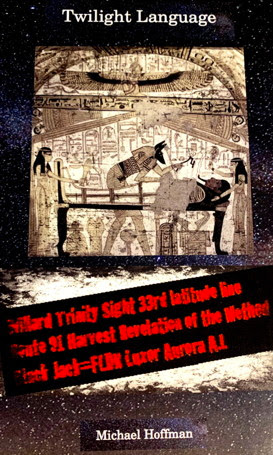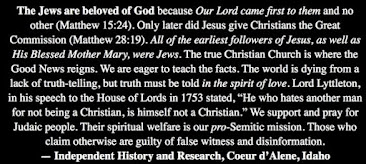Counterfeit-Israel ascends as the Holy Family and
Nativity scenes descend
THE HANUKKAH HOAX
By Michael Hoffman
Nativity scenes descend
THE HANUKKAH HOAX
By Michael Hoffman
www.revisionisthistory.org
Advent, 2015—Christmas is a problematic time for Orthodox rabbis and their followers since it celebrates the birth of the Jesus they hate. The rabbinic term for Christmas Eve is Nittel Nacht, a night they regard as accursed.
There is a rabbinic tradition of refraining from marital relations on Nittel Nacht. According to Rabbi Baal Shem Tov, the founder of Hasidic Judaism, to conceive a child on Nittel Nacht will result in the birth of either an apostate or a pimp.
The most prominent rabbinic custom commonly observed on Christmas Eve is to abstain from “Torah” (Talmud) study. There is an anxiety that one’s Talmud study may unwillingly serve as merit for Jesus’ soul, corresponding to the teaching that Talmud study gives respite to the souls of all the wicked.
Refraining from Talmud study on Nittel Nacht also serves as a sign of mourning, corresponding to the rabbinic belief that Jesus “was a false messiah who deceived Israel, worshipped a brick, practiced the magic he learned in Egypt” (Babylonian Talmud, Sanhedrin 107b); and “was born of a harlot who conceived while she was niddah (menstruating)” (Babylonian Talmud, Kallah 51a).
There is a Talmudic custom of eating garlic on Nittel Nacht. The reason for this is attributed to the odor of the garlic which is reputed to repel the demonic soul of Jesus, which is supposed to wander on Christmas Eve like Scrooge’s dead partner Marley (cf. the rabbinic text Nitei Gavriel Minhagei Nittel). Another widespread rabbinic custom in Orthodox Judaism is to make toilet paper on Christmas Eve, a practice made popular among Hasidic Judaics by the Chiddushei Harim (cf. Reiach Hasade 1:17).
Contrast these grostesque Nittel Nacht mockeries from the lowest septic tank in hell, with the heavenly story of the Holy Family in Bethlehem: the radiant Virgin and Christ child, humble shepherds, and angels offering glad tidings of peace on earth to men of good will. Frankly, there is no comparison between Talmudic Judaism and true Christianity, and those who attempt to assert that Christianity has ecumenical similarities with the religion of the Talmud are more deluded than the degraded practitioners of Nittel Nacht themselves.
This year Christmas Eve falls on a Thursday. Nittel Nacht and its blasphemies and toilet-paper construction will take place on December 24 as usual. Pray for the Talmudists engaged in this crazed, hate-filled anti-Christian bigotry which the mainstream media will not report or denounce.
What is Hanukkah?
Hanukkah is a Talmudic holiday that is a burlesque of the Biblical account of the Maccabees. Hanukkah is celebrated cursorily in the Israeli state and observed in the United States as competition for Christmas, in order to symbolically assert the supremacy of Klal Yisroel (the Judaic people) over the rest of humanity. The secret of Hanukkah was disclosed by Rabbi Levi Isaac ben Meir of Berdichev (renowned as “the Kedushat Levi” after his eponymous treatise), a prominent eighteenth century halachic (legal) authority.
Rabbi Meir revealed a secret known only to a few: that lighting the Hanukkah menorah does not commemorate the victory of the Biblical Maccabees. The arcane traditional doctrine of Chazal (i.e. the “sages” of the Talmud) concerning Hanukkah is that it commemorates God’s “delight in the Jewish people” themselves, and their vainglorious celebrations. The secret teaching of Hanukkah is that God supposedly provided a mythical eight days of oil not as a means of facilitating a victory, or of guaranteeing the successful completion of a sacred duty, but rather as a sign (halacha osah mitzvah), of His continuing adoration of the Judaic people, which all the rest of us are supposed to emulate, as we in fact do, whenever we allow a menorah to be erected where a Nativity scene is banned.
Hanukkah is Talmudism’s principal weapon for injecting the religion of the Talmud into the civic life of our nation during the month of December, at a time when Christianity and its symbols, such as Nativity scenes, are increasingly marginalized or banned completely from the public square, in favor of menorah lightings, “Sanny Claws” and the collective jingle of cash registers. The lower Jesus, Mary and Joseph are made to descend during the Christ Mass season, the higher the Menorah and the Judaic self-worship it represents, rises.
In the religion of Judaism, the Hanukkah menorah is the symbol of the supreme position which Talmudic People supposedly occupy in God’s eyes. The Hanukkah menorah is not a symbol of a Biblical occurrence. Hanukkah is a man-made Talmudic tradition intended for self-idolatry. It represents the victory not of the Maccabees over the pagans, but of the selective memory of the rabbis over history.
Hanukkah is an enduring commitment to the dark racial and religious conceit of the rabbinic and Zionist Judaics, disguised as holiday light and cheer for all, and as such it is a kind of abbreviation for and summation of the strange god of self-adulation which is the central idol of the votaries of Orthodox Judaism, and the central violation of the First Commandment of Exodus 20:3: לא יהיה־לך אלהים אחרים על־פני.
Michael Hoffman is a former reporter for the New York bureau of the Associated Press. He is the author of Judaism’s Strange Gods, and Judaism Discovered, and the editor of Prof. Alexander McCaul’s The Talmud Tested and Johann Eisenmenger’s Traditions of the Jews.
_____________________________













11 comments:
Should that not be
Mittel Nacht
instead of Nittel Nacht ?
The rabbis refer to it as Nittel Nacht; cf. the rabbinic text Nitei Gavriel Minhagei Nittel.
Was Jesus Christ a Talmudic Jew? In John 10:22-23, we find Jesus in the Jerusalem temple at "the feast of the dedication."
"It was now winter, and Jesus was in Jerusalem at the time of Hanukkah" (John 10:22, New Living Translation).
In John 10:22, the English word "dedication" is a translation of the Greek word egkainia, which refers to the annual feast celebrated eight days beginning in the 25th of Chislev (middle of our December), instituted by Judas Maccabaeus [164 BC] in memory of the cleansing of the temple from the pollution of Antiochus Epiphanes.
See Strong's Exhaustive Concordance Hebrew and Aramaic Dictionary entry #1456.
Dear Mr. Calvert: The “New Living Translation” is a paraphrase of the Scripture for children and semi-literate people and not a precise or accurate translation. John 10:22 refers to the Feast of the Dedication which celebrates the rededication of the Israelite temple in December 164 B.C., after its desecration by the pagan ruler Antiochus. 1 Macc. 1:41-59, shows that, like the rabbis of our time, King Antiochus forbade the true worship of Yahweh and the correct use of the Scriptures.
The attendance of Jesus at the Feast of the Dedication in no way implicates him in the perverted Talmudic Hanukkah, which is dedicated to Judaic self-worship in defiance of Yahweh.
Judaism mimics the religion of the Bible. It has a Moses, a Noah, and an 8 day festival. But these are not the Biblical Moses or Noah or 8 day festival. They are the result of warped thoughts of men whose spirits are diseased as a result of their rejection of Israel’s Messiah and the persecution of His followers.
Dear Mr. Hoffmann: I am well aware that the New Living Translation is a paraphrase. In John 10:22, however, its rendering of the Greek word egkainia as Hanukkah can be substantiated by several reputable lexicons and dictionaries.
For example, A Greek-English Lexicon of the New Testament and Other Early Christian Literature 3d ed. by by Frederick William Danker, Walter Bauer, William Arndt and F. Wilbur Gingrich has the following under the Greek word egkainia: "festival of rededication J 10:22, known also as Hanukkah and the Feast of Lights, beg. the 25th of Chislev (roughly=November-December) to commemorate the purification and rededication of the temple by Judas Maccabaeus on that date in 165 BC." Likewise, the
UBS Greek Lexicon: n Jewish Feast of Dedication, Hanukkah.
Dear Mr. Calvert
If you’re well aware that the New Living Translation is a paraphrase, why did you use it?
And what exactly is your point of trying to implicate Our Lord in Talmudic practices based on a reference to Hanukkah? In the context of John 10:22, the verb hanak (dedicate) and the corresponding noun hanukkah refer to the cleansing of the Temple by Judas Maccabaeus. If you are misdirected by the fact that counterfeit-Israel uses this term as a cover for its Babylonian ceremonies, then perhaps you should consider that rabbinic Judaism burlesques many Biblical feasts (such as Booths), just as it uses the name of Moses as a cover for its anti-Mosaic religion. Obviously Jesus observed the Bible religion, not the Talmudic religion of man-made traditions pretending to be Scriptural.
Dear Mr. Hoffman: The Hebrew word Hanukkah is the equivalent of the New Testament Greek word egkainia; they both have the same meaning of dedication. The feast of the dedication was instituted by Judas Maccabaeus in 164 B.C. to commemorate the rededication of the temple. As far as I am aware, Judas Maccabaeus was neither a Talmudic Jew nor a Pharisee. Jesus Christ was a Torah observant Jew who apparently had no problem with observing this feast (John 10:22-23). That was the point of my using the NLT. However the Pharisees, or the Talmudic Jews, later changed the observance of this feast is totally irrelevant to the fact that Christ had no problem observing it. If we were to reject every practice later changed by organized religion, we would have nothing. That's the point.
James
Dear Mr. Calvert
You seem to be backtracking on your initial insinuation as represented by your rhetorical question:
Was Jesus Christ a Talmudic Jew? In John 10:22-23, we find Jesus in the Jerusalem temple at "the feast of the dedication.”
If the fact that the "Pharisees, or the Talmudic Jews, later changed the observance of this feast is totally irrelevant to the fact that Christ had no problem observing it,” why did you raise the issue in the first place?
Nowhere have we stated or implied that observance of Old Testament festivals prior to the Resurrection of Jesus renders one a “Talmudic Jew.”
Moreover, Jesus wasn’t just a “Torah-true Jew,” He was the Torah — the Word made flesh.
Finally, it needs to be said that everything connected with the Temple was destroyed in 70 A.D. as Jesus said it would be, by His Heavenly Father — using the Roman General Titus as the instrument of divine wrath upon a faithless nation.
The Roman army carried the Menorah of the Temple away with them and paraded it through the streets of Rome, as depicted on the Arch of Titus, which is remarkably well preserved even unto this day, despite the fact that Italian Talmudists will not permit the Arch to be shielded from automobile pollution or the elements.
What about 1 Ma 4:59? It seems that it was Biblical for a while until the Rabbis talmudized it. Is this correct?
"And Judas, and his brethren, and all the church of Israel decreed, that the day of the dedication of the altar should be kept in its season from year to year for eight days, from the five and twentieth day of the month of Casleu, with joy and gladness"
To Jacob: Christmas can be a pagan capitalist holiday or it can commemorate the incarnation of Jesus Christ. It depends on how it is celebrated. For a definitive reply to your accusation please read Ralph Woodrow’s book, “Christmas Reconsidered” (Palm Springs Calif., 2006).
As for Jesus not being mentioned in the Talmud Bavli, this is the well-worn, standard big lie of Orthodox Judaism, which was demolished by Peter Shafer in his book “Jesus in the Talmud” (Princeton Univ. Press).
This is the difference of the languages of German "Hoch Deutsch" and the spoiled version of ashkenazim, jews livig in German speaking area.
Post a Comment